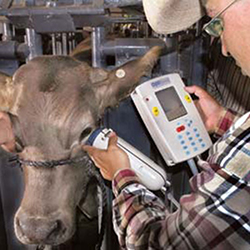UPDATE – Electronic ID Mandate is another hit to small Farmers
 USDA decision will benefit foreign markets at the expense of local small-scale cattle producers, consumers and the resilience of our food system!
USDA decision will benefit foreign markets at the expense of local small-scale cattle producers, consumers and the resilience of our food system!
The U.S. Department of Agriculture has announced a final rule on the “Use of Electronic Identification Eartags as Official Identification in Cattle and Bison.” Under this new rule, in 180 days all official eartags sold for or applied to cattle and bison must be readable both visually and electronically (EID).
Judith McGeary, Esq., Executive Director of Farm and Ranch Freedom Alliance (FARFA), issued the following statement:
“This rule comes over the protests of independent farmers and ranchers across the country – in particular, small and regenerative producers that are vital to long-term food security in our country.”
While USDA was cautious in the official language of the rule to try to justify the new electronic mandate based on supposed animal health grounds, the agency’s press release shows what this is really about: supporting export markets. The agency likes to echo claims from the big corporations that "international markets benefit everyone". But small farmers and ranchers have known for decades – and American consumers discovered during COVID and the more recent spikes in food inflation – that those massive corporations are the real beneficiaries of international markets, at the expense of farmers, consumers, and the resilience of our food system.
While USDA touts new and expanded programs to promote regenerative farmers and ranchers, this new rule places more burdens on those same farmers and ranchers, undermining their economic viability.
USDA presents the rule as “enhancing” the 2013 rule on Animal Disease Traceability. But having served as vice-chair of the USDA Secretary’s Advisory Committee on Animal Health at that time, McGeary sees it as the opposite. The Committee, and the wide range of stakeholders it represented, worked for years to develop a compromise with USDA that resulted in a workable rule that addressed animal traceability while not imposing unnecessary costs on producers. The provision specifying that producers could choose among several types of ear tags – including low-cost metal tags or expensive electronic tags – was absolutely central to those negotiations. Now, the USDA is ignoring the concerns and objections from numerous stakeholders in order to cater to agribusiness at the expense of our farmers and ranchers.
USDA’s press release also signals what FARFA has said for years, that this is a move backward to the wildly unpopular proposal for the National Animal Identification System (NAIS). The agency withdrew the NAIS plan after massive outcry, replacing it with the 2013 ADT Rule. But the announcement accompanying this new rule says that the agency “is committed to implementing a modern animal disease traceability system that tracks animals from birth to slaughter” – the same language used to describe the NAIS. The agency’s decision to renege on the 2013 agreement to allow non-electronic forms of identification appears to be the first step to recreating a NAIS-type program.
FARFA will continue to fight against the implementation of this bad rule that hurts small farmers and independent ranchers. We need policies that benefit producers, not international corporations.
####
